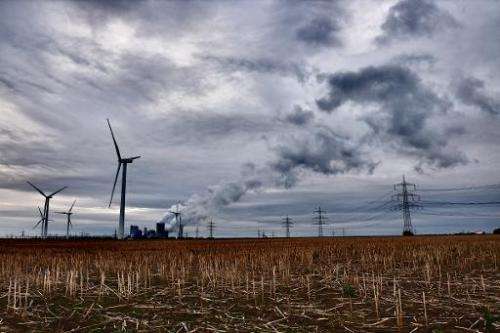G20 states spend $88bn in fossil fuel exploration subsidies

Leading world economies are spending $88 billion (71 billion euros) a year in fossil fuel exploration subsidies, sapping investment from low-carbon alternatives and increasing the risk of "dangerous climate change", a report said Tuesday.
The report by Britain's Overseas Development Institute think tank said that these subsidies "could drive the planet far beyond the internationally agreed target of limiting global temperature increases to no more than two degrees Celsius".
The report was published in conjunction with Oil Change International, a US advocacy group, and comes ahead of a meeting of G20 leaders this weekend in Brisbane, Australia.
Britain, Russia, the United States and Australia had some of the highest national subsidies, said the report, which pointed in particular to Washington providing $5.1 billion to fossil fuel industries last year—almost double the level in 2009.
The report also pointed to investments made by state-owned companies as a form of subsidy particularly prevalent in Brazil, China, India, Mexico, Russia and Saudi Arabia.
"Levels of support range from $2-5 billion in Russia, Mexico and India, to $9 billion in China, $11 billion in Brazil and $17 billion in Saudi Arabia," it said.
It identified public finance as a third form of subsidy for supporting fossil fuel exploration, highlighting its use in Canada, China, Japan, Russia and South Korea.
The report said that the funds were "uneconomic investments" and "a publicly financed bailout for carbon-intensive companies" at the expense of wind, solar and hydro-power.
"Without government support for exploration and wider fossil-fuel subsidies, large swathes of today's fossil-fuel development would be unprofitable," the report said.
It gave as an example the Prirazlomnoye project, Russia's first Arctic offshore site, saying that "even with extensive tax breaks and public investment in infrastructure, the project is of dubious commercial viability".
"Two-thirds of the reported internal rate of return of 14 percent can be traced to tax breaks," it said.
It also pointed to "a large gap between G20 commitment and action" since the G20 powers had agreed five years ago to phase out "inefficient" fossil-fuel subsidies.
The authors called on governments to "act immediately" to phase out subsidies and said that carbon should be priced "to reflect the social, economic and environmental damage associated with climate change".
The report said fossil fuel exploration subsidies were only part of the picture with global subsidies for the production and use of fossil fuels adding up to $775 billion in 2012 compared to $101 billion for renewable energy spent in 2013.
© 2014 AFP


















